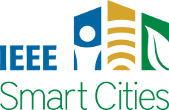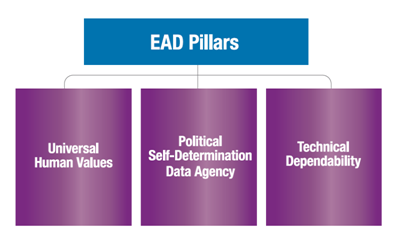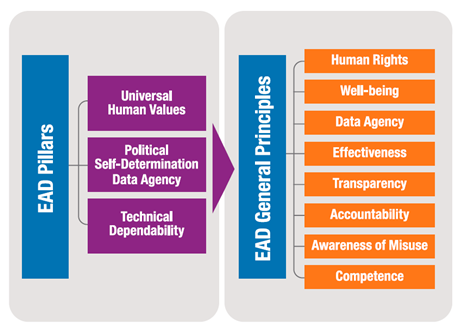AI Ethics in Smart Cities: Starting Points for Discussion in Society
Written by Euclides Lourenco Chuma and Gabriel Gomes de Oliveira
Recent discussions in global media regarding the impacts of OpenAI ChatGPT tool on education, fraud, and even on the disappearance of some professions serve as a warning to all sectors using Artificial Intelligence (AI) or Autonomous and Intelligent Systems (A/IS)as a technological tool, including Smart Cities. Therefore, we need to discuss the use of AI with society to avoid unfounded speculation that could harm the technological development of Smart Cities. In this article, we suggest discussing the projects that use AI or A/IS technologies with society, including Smart Cities following General Principles from IEEE Ethically Aligned Design, to gain the support of society in this technological development and avoid news with speculation and misinformation that can negatively impact such projects.
Introduction
Tools like OpenAI ChatGPT, despite bringing technological innovations, are not an excellent example of how new A/IS and other technologies should be included in society and the same is valid in Smart Cities. OpenAI ChatGPT did not have its launch impact previously discussed with society, which had direct impacts on education and professional career, causing senseless fear in society.
Artificial Intelligence (AI) ethics [1] or, more precisely, for technical areas, “Autonomous and Intelligent Systems” (A/IS) Ethically Aligned Design (EAD)[2] is an emerging and interdisciplinary field that addresses the ethical issues in A/IS.
The increasing use of A/IS will substantially change humanity. Therefore, we need to establish social and political guidelines so that such systems remain human-centered, serving humanity’s values and ethical principles [3].
A good definition for Smart Cities is that they are urban spaces that use technological or non-technological products and services that: improve the social and ethical well-being of its citizens; provide quality, performance, and interactivity of urban services to reduce costs and resource consumption; and increase contact between citizens and the government [4].
Therefore, Smart Cities and A/IS must be developed, implemented, and operated for the benefit of humanity and the environment necessary for human life. Therefore, human well-being must be beyond the technical priorities of A/IS because only then will society establish a link of trust with A/IS and, consequently, with Smart Cities, and there will be a true meaning of the usefulness of this technology for human beings.
IEEE Ethics of Autonomous and Intelligent Systems
Recently, the IEEE has been developing "The IEEE Global Initiative on Ethics of Autonomous and Intelligent Systems (A/IS)," which is an EAD that will provide pragmatic and directional insights and recommendations, thereby serving as an essential reference for the work of technologists, educators, and policymakers in the coming years involving the AI ethics.
The IEEE freely offers the EADguide [2] that features scientific analysis and resources, high-level principles, and actionable recommendations with a vision to prioritize human well-being with A/IS.
IEEE’sEAD guide (conceptual framework) has three pillars that can be broadly categorized as reflecting anthropological, political, and technical aspects (Figure 1).
Figure 1: Three pillars from IEEE Ethically Aligned Design [2].
- Universal Human Values: A/IS must be designed to respect human rights, align with human values, and improve human well-being. They should also be designed to safeguard our environment and natural resources.
- Political Self-Determination and Data Agency: A/IS has a great potential to nurture political freedom and democracy through the cultural precepts of individual societies when people have access and control over the data constituting and representing their identity, and their data is probably protected.
- Technical Dependability: A/IS will reliably, safely, and actively accomplish the objectives they were designed for while advancing the human-driven values they intended to reflect. Technologies should be monitored to ensure that their operation meets predetermined ethical objectives aligning with human values and respecting codified rights. Additionally, validation and verification processes, including aspects of explainability, should be developed for better audibility and certification of A/IS.
From the three pillars, IEEE EAD proposes “General Principles,” which are ethics and values that should be followed during the design, development, and implementation of A/IS(Figure 2).
Figure 2: General Principles from IEEE Ethically Aligned Design [2]
- Human Rights: A/IS shall be created and operated to respect, promote, and protect internationally recognized human rights. Human rights are defined by international law and provide a solid legal basis for Smart Cities projects that need international economic and technological resources.
- Well-being: A/IS creators shall adopt increased human well-being as a primary success criterion for development. In smart city initiatives, we often find the quality of life of its population as one of its objectives. In this context, well-being human and quality of life are interconnected.
- Data Agency: A/IS creators shall empower individuals with the ability to access and securely share their data to maintain people's capacity to have control over their identity. One of the most significant barriers in Smart City projects is how the acquired data will be treated. Currently, governments already have agencies and legislation for data maintenance. Therefore, when developing a Smart City project, one should consult government agencies about the legality of data use before the project is implemented.
- Effectiveness: A/IS creators and operators shall provide evidence of the effectiveness and fitness of A/IS. In Smart Cities, efficiency measures are intrinsic to the concept.
- Transparency: The basis of a particular A/IS decision should always be discoverable. In Smart Cities projects, transparency will bring tranquility and confidence to the population. Transparency can be integrated through certification systems by independent agencies, as in the case of IEEE CertifAIEd, a certification program to evaluate the ethics of Intelligent Autonomous Systems (AIS) to help protect, differentiate, and increase the adoption of products [5].
- Accountability: A/IS shall be created and operated to provide an unambiguous rationale for all decisions. The legislatures/courts should clarify responsibility, culpability, liability, and accountability for problems in Smart City, where possible, prior to development and deployment so that manufacturers and users understand their rights and obligations.
- Awareness of Misuse: A/IS creators shall guard against all potential misuse and risks of A/IS in operation. The most effective action to prevent the misuse of Smart Cities resources is educating society as a whole and, as a last resort, applying laws.
- Competence: A/IS creators shall specify, and operators shall adhere to the knowledge and skill required for safe and effective operation. Entities that operate Smart Cities should create documented policies to govern how Smart Cities should be operated. And before operating a system, ensure the operators have the requisite competencies.
The next concept in IEEE EAD is the Chapters that provide in-depth subject matter expertise that allows readers to move from the General Principles to thoroughly analyze ethical A/IS issues within the context of their specific work. However, in this article, we propose that before proceeding with any A/IS project involving Smart Cities, one should reflect on it following the “General Principles.” This reflection must be individual and collective, preferably with the members of society who are most interested in the project.
This reflection and discussion in a society guided by the "General Principles" must be documented. This attitude will be reflected in greater confidence in employing A/IS technology, as well as the societal support that projects based on such technology need. The Smart Cities concept already places society as the project's objective "...technologies for the benefit of society...”
Conclusion
Discussing projects involving AI or A/IS within society following the “General Principles” from IEEE EAD topics will gain society's support in technological development while avoiding news with speculations and misinformation that can negatively impact projects based on AI or A/IS used in Smart Cities.
Finally, all discussions should be documented for future comprehension of the decision-making process and used as a source for improving the process.
References
- D. Leslie, Understanding artificial intelligence ethics and safety, The Alan Turing Institute, 2019, [online] The Alan Turing Institute, Available: https://www.turing.ac.uk/sites/default/files/2019-06/understanding_artificial_intelligence_ethics_and_safety.pdf. [Accessed Feb. 23, 2023].
- Ethically Aligned Design A Vision For Prioritizing Wellbeing With Artificial Intelligence And Autonomous Systems, IEEE Standards Association, 2016, [online] Available: https://standards.ieee.org/industry-connections/ec/ead-v1/ [Accessed Feb. 23, 2023].
- First Draft of the Recommendation on the Ethics of Artificial Intelligence, UNESCO, 2020, [online] Available: https://unesdoc.unesco.org/ark:/48223/pf0000373434 [Accessed Feb. 23, 2023].
- R. Hammons, J. Myers, Smart Cities, IEEE Internet of Things Magazine, 2019, v.2, i.2, pp.8-9.
- IEEE CertifAIEd - The Mark of AI Ethics, IEEE Standard Association, 2023, [online] Available: https://engagestandards.ieee.org/ieeecertifaied.html [Accessed Mar. 13, 2023].
Keywords: AI; Smart Cities; Ethics; Society; ChatGPT
This article was edited by Sandeep Shekhawat.
To view all articles in this issue, please go to May 2023 eNewsletter. For a downloadable copy, please visit the IEEE Smart Cities Resource Center.


To have the eNewsletter delivered monthly to your inbox, join the IEEE Smart Cities Community.
Past Issues
To view archived articles, and issues, which deliver rich insight into the forces shaping the future of the smart cities. Older eNewsletter can be found here. To download full issues, visit the publications section of the IEEE Smart Cities Resource Center.





